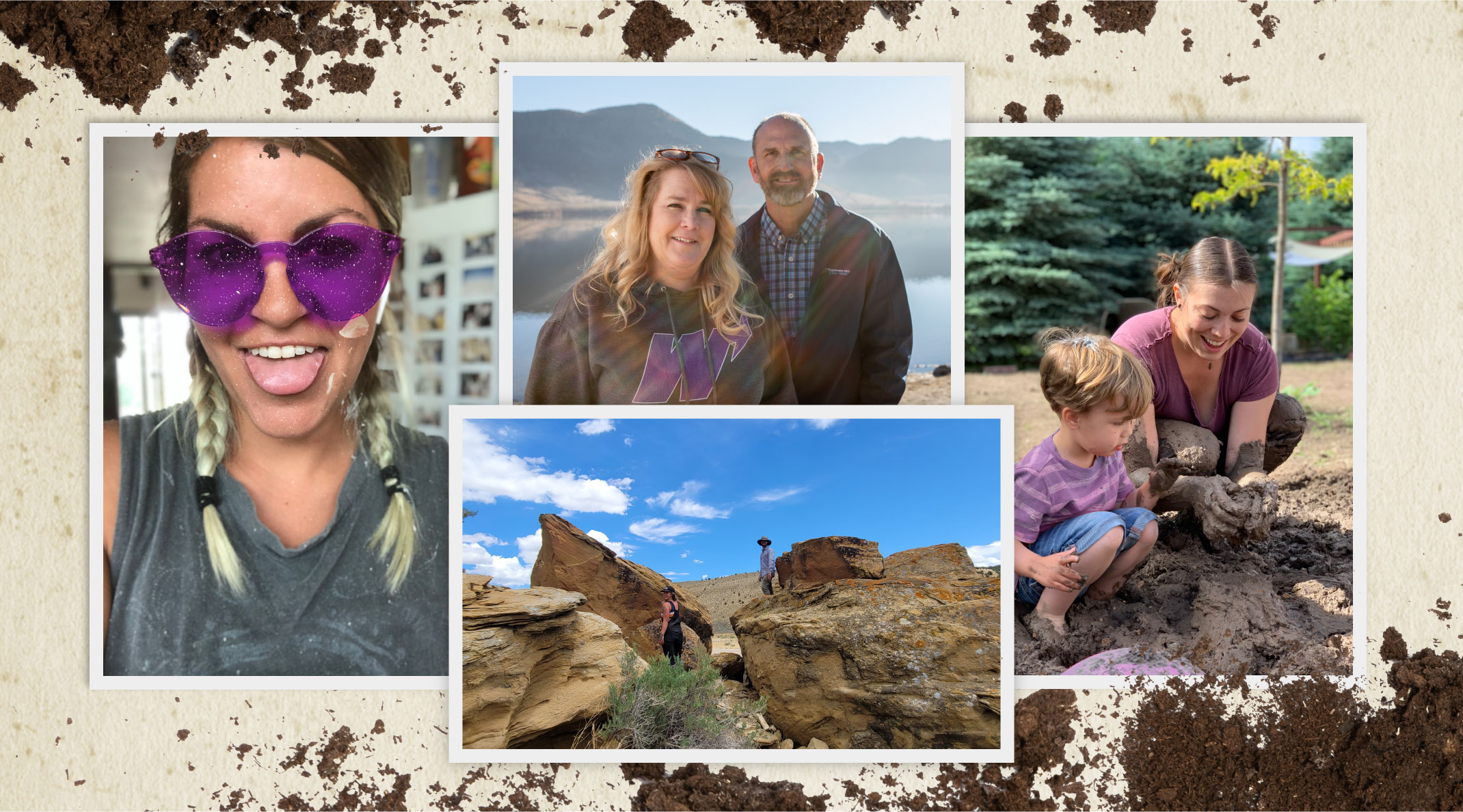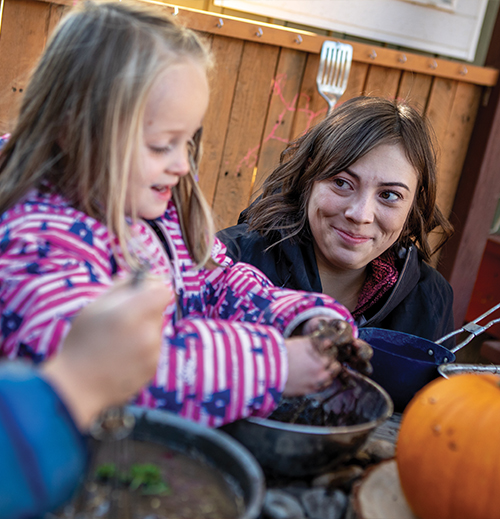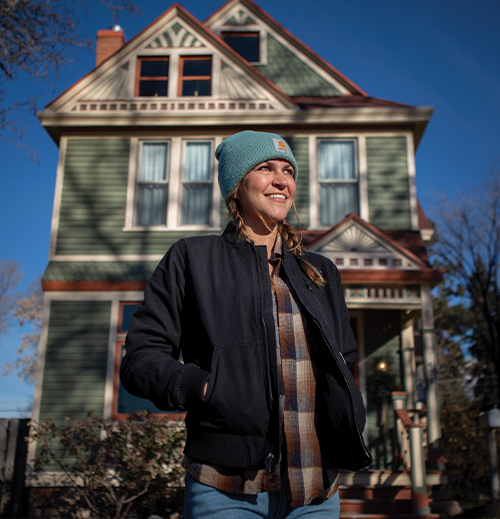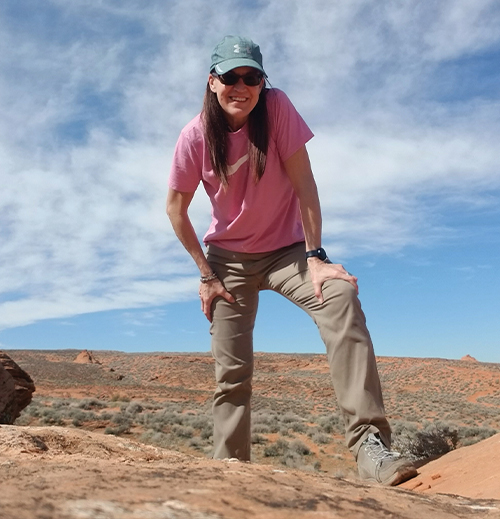
Spilling the Dirt
Weber State prepares many alumni for careers that definitely require a shower at the end of the day, from remodeling homes to treating sewage water to rolling in mud with preschoolers. Those making a mess with their careers are driven by passion for their work as they improve the world around them, even if they get their hands dirty.
Jaime Winston, Marketing & Communications
 Demi Parker
Demi Parker
Mud pie chef and toddler wrangler, Bachelor of Science in Early Childhood Education and Elementary Education, 2019
The Job
Demi Parker recalls getting wrapped up in the stories her elementary school teacher Lynette Grow BS ’75 read to the class, changing her voice to fit each character.
Nearly 20 years later, Parker was working her shift at Rooster’s Brewing in Ogden, when Grow came in for a meal. Despite years gone by and changes in Parker’s height and appearance, Grow remembered her student fondly.
“The fact she remembered my name and the year I was in her class, I was like ‘Wow, that is incredible,’” Parker said.
Inspired by Grow and a recent stint as a kids’ ski instructor at Snowbasin, Parker decided to change her life and pursue a degree in education.
While attending 91短视频, she taught at Mountain Kids Preschool, which was directed by a friend she met while working at Rooster’s. When that friend decided to close her school, they both moved on to a nature- and play-based preschool run by teacher Jenny Rogers. Along with playing outdoors, kids plant and harvest produce from the school’s garden, feed the school’s chickens and collect eggs.
What Makes It Dirty
Like most 3- to 5-year-olds, those attending SimpleLife need to be trained not to share their germs. “We’re big on teaching the children proper hand washing, nose blowing, coughing, sneezing, etcetera,” Parker said.
While novices in personal hygiene, the children are given other avenues to get dirty, the most popular of which is “the mud kitchen.”
“It’s like a play kitchen, but with mud,” Parker said. “We allow the children to mix dirt and water, and they put it in pots; then they can add rocks and leaves and make their creations.”
The mud kitchen is also stocked with spoons, potato mashers and other tools for creating imaginary gourmet meals from mud.
One of SimpleLife’s philosophies is that teachers should participate in activities, too, so it’s not uncommon for Parker to join the muddy fun.
“I’m not afraid to get my hands dirty,” she said.
Last year was especially muddy during the school’s summer camp.
“Miss Jenny had just removed her grass to put in new sod, so we said ‘Let’s take advantage of all this dirt.’ We turned the sprinklers on and let it get muddy, and we all jumped in the mud and played together, totally covering our bodies in mud.”
Kids can also get messy in the school’s attached art studio, which includes ceramics and a kiln. Of course, the school also teaches kids to clean up after the fun of making the mess.
Why She Loves It
“I’ve taught so many children, and I’ve made so many meaningful relationships,” Parker said. “It’s amazing to see them grow.”
 Cady Poorman
Cady Poorman
Paint, grout and metal shavings arranger, Bachelor of Fine Arts in Photography, 2014
The Job
As a fine arts major, Cady Poorman studied many art forms, from sculpture to printmaking, and learned the importance of making art with meaning, not just something that “looked cool,” from mentors like associate professor Joshua Winegar.
“I also learned a lot about myself,” she said. “I consider my time studying art at Weber State some of the best and most-meaningful years of my life.”
While 91短视频 felt like home, it took Poorman some time to find her place in the job market after graduation. Working in jobs ranging from waitressing to graphic design, she eventually realized there isn’t just one place for her.
Today, she is a portrait photographer, Airbnb host, home interior designer and home seller, and she works in her husband Robbie Hogge’s residential remodel business, along with their business partner Tyson Goodson. As of 2022, they had flipped five homes and worked on many other remodel jobs for clients.
What Makes It Dirty
Poorman is frequently covered in paint or tile mud.
“Or sometimes grout, which is a weird one,” she said. “It will come off of your skin when you wash it, but not your fingernails, so I’ll just have weird, unhealthy-gray-looking nails for a few days.”
At times, the messes can also be hazardous.
“I’ve gotten way more random substances in my eyes than I would like to admit, including a metal shaving that got stuck in my eye and immediately started to rust into my eye,” Poorman said. “That was a fun doctor visit.”
Her dirtiest moment, though, came while updating the home she shares with her husband. Taking showers in the couple’s geodesic dome home led to a flooded basement. Soon, the couple realized it was a septic tank problem.
“So we had to get the septic tank pumped and emptied out,” she said. “When they pulled the lid off, it was solid black sludge to the brim. We then had to completely re-dig the drainage field. It was a very big learning experience.”
She shares her messy moments, as well as before and after photographs of homes, on
“People are just stoked to see a construction company that’s flipping homes actually care a lot about the final product and put a lot of thought and effort into making a home look and feel beautiful, unique and timeless,” she said.
Why She Loves It
Designing the finishes of a home remodel is like one big art project. Poorman enjoys picking colors, combining textures and creating a certain feeling in the home.
Additionally, she enjoys preserving a piece of history. “I find it really sad when beautiful, original handwork gets removed, painted over or just not cared for in the way it deserves,” she said. “Old homes tell a story of the past, and it’s important that we, as a residential remodel business, do our part in preserving that rich history.”
 Sandy Pagano
Sandy Pagano
Dirt discoverer, Master of Business Administration, 2018; Bachelor of Integrated Studies in Archaeology, Sociology and Anthropology, 1996
The Job
With her BIS, Sandy Pagano went to work in archaeology, taking on positions as an archaeological technician at Utah State University and the Center for Environmental Archaeology, and for 17 years as field director at Ogden archaeology business Sagebrush Consultants. Now with her MBA, she works as a project archaeologist and field supervisor for , which conducts surveys and excavations before construction projects as well as for agencies like the Bureau of Land Management and Utah Department of Wildlife Resources.
Sites are defined as localities that include artifacts over 50 years old and are protected through regulations laid out in Section 106 of the National Historic Preservation Act.
She might be able to drive to a site, or it could require a 15-mile hike, hauling archaeological equipment with her crew along the way. On remote projects, the crew often camps overnight.
Usually jobs do not require an excavation, but they are required if a site will be damaged or destroyed by a proposed project.
Her most recent excavation was at a golf course near Jordanelle Reservoir, where her team found projectile points (arrowheads) and grinding stones (used for processing foods such as pine nuts and corn) that were likely utilized by the Fremont people around A.D. 1200.
“I really get to see this state in a way that most people wouldn’t,” she said.
Unique and rare items are often brought to the Utah Museum of Natural History to be used for research or in museum displays.
What Makes It Dirty
“When we do excavations, it’s disgusting,” Pagano said. “You get dirty on all of them. Just when you’re shaking a screen full of dirt, and that dust cloud envelopes you, you get it in your ears, your nose, your eyes.”
Her dirtiest dig took place under Interstate 15 in South Salt Lake, before road improvements to prepare for the influx of visitors during the 2002 Winter Olympics.
“They found a historic dump while constructing the freeway, and we ended up working overnight out there using backhoes and just swinging up the grossest mud,” she said. “That was a really good soupy mess.”
The site revealed a garbage dump used by Salt Lake residents between the 1910s and 1930s. Pagano and her crew wore paper suits to keep their clothes clean as they went through the garbage. “There was some neat stuff in there,” she said. “You could pull newspapers out and actually still read them.”
Why She Loves It
Pagano loves making discoveries.
“People don’t have any idea what’s in their backyard,” she said.
She also loves the mix of being outside, hiking, camping, surveying and excavating, and completing reports in her air-conditioned office.
In 2009, Odd Fellows Hall in Salt Lake City, built in 1891, was relocated to make way for the city’s new federal courthouse. Historic artifacts from Pagano and her team’s excavation of the site are now displayed in the Moss Courthouse in Salt Lake City.
.jpg) Richard and Jennifer Mickelsen
Richard and Jennifer Mickelsen
Richard: wastewater pollutant connoisseur, Bachelor of Science in mathematics and chemistry, 1991
Jennifer: algal bloom, grease and solid waste detective
The Job
Jennifer and Richard Mickelsen know what you flush.
They met at 91短视频 while working in the lab with chemistry professor Edward Walker BA ’76. After graduation, they worked in the nutraceutical and pharmaceutical industries. They have several patents from their research. They opened RJ Analytical, using their expertise to test the potency and purity of products for businesses using natural products, such as supplement companies.
Then, in 2000, Richard started a second career in wastewater while Jen cared for their four children.
First, he worked for the Central Weber Sewer Improvement District and also advised Plain City’s wastewater treatment plant. He later ran the treatment labs for Brigham City and then Provo. Now, he serves as district general manager for which treats about 20 million gallons of wastewater per day for northern Utah County.
The district removes more than 98% of pollutants from the wastewater, which flows into Utah Lake.
“You flush the toilet, and all that stuff just goes away,” Richard said. “People don’t even think about it.”
Along with pollutants, which Richard refers to as “soluble sugars,” “floatables,” and “poop,” the district removes nutrients that otherwise allow algae to grow.
Jennifer spent most of her career at RJ Analytical, but also took a position at the . Her facility also tests drinking water, and Jennifer serves as the city’s industrial pretreatment coordinator, ensuring local industries follow EPA guidelines to prevent wastewater pollution. Like Richard, she’s also concerned about algal blooms, not produced from wastewater, but from mountain streams flowing into Mantua Reservoir.
What Makes It Dirty
Along with the expected excrement, Jennifer has seen odd things come to her facility in the wastewater, like old T-shirts and blankets. Richard recently saw an entire push broom come through the water to his facility.
Through the treatment process, many of these solids are removed. “And it doesn’t always smell great,” Jennifer said.
Oils and grease people put down their drains are often much grosser than the solids. However, one solid — disinfectant wipes flushed by a local convenience store that clogged a sewer line — sticks out in Jennifer’s mind.
“They were a foot wide by 14 inches long. They don’t dissolve at all,” she said.
When she pulled a manhole cover to remove them, she recalls “big clogs of these wipes with everything you can imagine backing up behind them.”
Why They Love It
“It’s very rewarding that we’re actually doing something to clean the environment,” Richard said. “Everybody talks about doing something. We actually are doing something about it every day.”
Jennifer echoed Richard’s sentiment and added that their jobs allow them to continually learn, and pass on their knowledge.
In addition, lab science has become a family tradition.
Their son, Richard, a 2020 91短视频 chemistry graduate, runs RJ Analytical’s lab, where his sister, Maile, a current 91短视频 student taking chemistry courses, also works. Another daughter graduated from BYU in molecular biology. However, Jennifer said that their other son, who is currently serving a religious mission in Africa, may buck the trend and study business when he returns.
Write to us about your dirty job at magazine@weber.edu.
